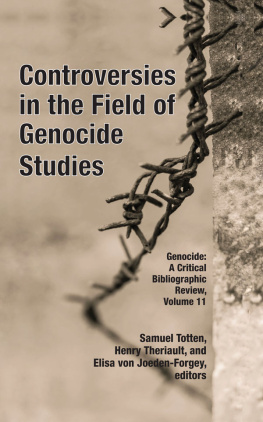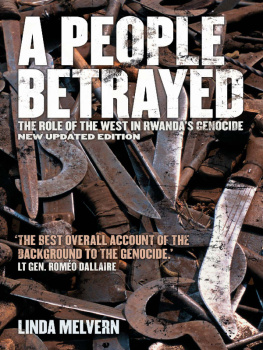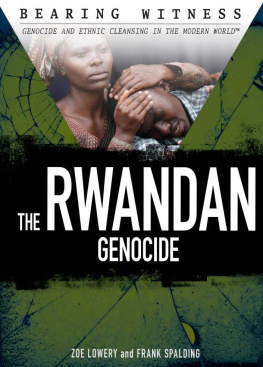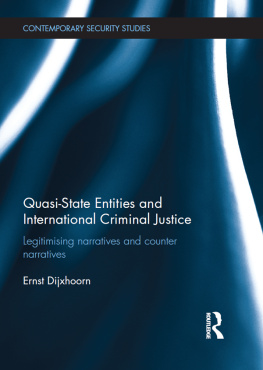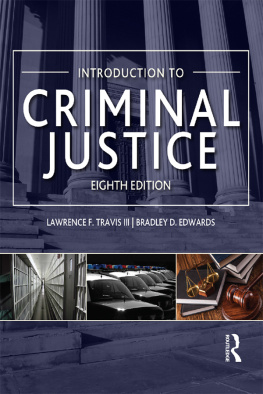
JUSTICE IN AFRICA
Contemporary Perspectives on
Developing Societies
JOHN MUKUM MBAKU, Series General Editor, Weber State University
MWANGI S. KIMENYI, Series Associate Editor, The University of Connecticut
Between 1989 and 1991, there were several changes in the global political economy that have had significant impact on policy reform in developing societies. The most important of these were the collapse of socialism in Eastern Europe, the subsequent disintegration of the Soviet Union, the cessation of superpower rivalry, and the demise of apartheid in South Africa. These events have provided scholars a new and challenging research agenda: To help the peoples of the Third World participate more effectively in the new global economy. Given existing conditions in these societies, the first line of business for researchers would be to help these countries establish and maintain transparent, accountable and participatory governance structures and, at the same time, provide themselves with more viable economic infrastructures. The Contemporary Perspectives on Developing Societies series was founded to serve as an outlet for such policy relevant research. It is expected that books published in this series will provide rigorous analyses of issues relevant to the peoples of the Third World and their efforts to improve their participation in the global economy.
Also in the series
Hope, K.R., Sr. (ed.) (1997), Structural Adjustment, Reconstruction and Development in Africa.
Mbaku, J. M. and Ihonvbere, J.O. (eds.) (1998), Multiparty Democracy and Political Change: Constraints to Democratization in Africa.
Kimenyi, M.S., Wieland, R.C. and Von Pischke, J.D. (eds.) (1998), Strategic Issues in Microfinance.
Magnarella, P.J. (ed.) (1999), Middle East and North Africa: Governance, Democratization, Human Rights.
Mbaku, J.M. (ed.) (1999), Preparing Africa for the Twenty-First Century: Strategies for Peaceful Coexistence and Sustainable Development.
Justice in Africa
Rwandas Genocide, Its Courts, and
the UN Criminal Tribunal
PAUL J. MAGNARELLA
University of Florida
Gainesville, Florida, USA
First published 2000 by Ashgate Publishing
Reissued 2018 by Routledge
2 Park Square, Milton Park, Abingdon, Oxon OX14 4RN
711 Third Avenue, New York, NY 10017, USA
Routledge is an imprint of the Taylor & Francis Group, an informa business
Copyright Paul J. Magnarella 2000
All rights reserved. No part of this book may be reprinted or reproduced or utilised in any form or by any electronic, mechanical, or other means, now known or hereafter invented, including photocopying and recording, or in any information storage or retrieval system, without permission in writing from the publishers.
Notice:
Product or corporate names may be trademarks or registered trademarks, and are used only for identification and explanation without intent to infringe.
Publishers Note
The publisher has gone to great lengths to ensure the quality of this reprint but points out that some imperfections in the original copies may be apparent.
Disclaimer
The publisher has made every effort to trace copyright holders and welcomes correspondence from those they have been unable to contact.
A Library of Congress record exists under LC control number: 99076655
ISBN 13: 978-1-138-70102-1 (hbk)
ISBN 13: 978-1-315-20429-1 (ebk)
Contents
PAUL J. MAGNARELLA, (Ph.D. Cultural Anthropology, Harvard University; J.D. International Law, University of Florida) is Professor of Anthropology and Affiliated Professor of Law and African Studies at the University of Florida. He has served as an Expert on Mission with the United Nations International Criminal Tribunal for the Former Yugoslavia and as President of the Association of Third World Studies. He currently serves as that Associations Special Counsel and Representative to the United Nations. His previous books include: The Peasant Venture (1979), Tradition and Change in a Turkish Town (1981), Human Materialism: A Model of Sociocultural Systems and a Strategy for Analysis (1993), and Anatolias Loom: Studies in Turkish Culture, Society, Politics and Law (1998). He has also edited The Middle East and North Africa: Democratization, Governance, and Human Rights (1999) and special issues of Third World Studies, The African Studies Quarterly, Human Peace and Human Rights, The International Journal of Anthropology, and Global Bioethics.
This book deals with the Rwandan genocide and judicial responses to it both at the national level of Rwandan courts and at the international level of the United Nations war crimes tribunal. I have written it for readers who are not necessarily legal specialists or anthropologists, but who want to understand why this horrendous human tragedy occurred and what, in the name of law and justice, is being done about it. Consequently, I have avoided technical vocabulary and extensive footnoting. I begin the book with an anthropological analysis of the genocide and its causes, utilizing the human materialist paradigm. I present elements from Rwandas history that seem to have contributed significantly to the calamity of 1994. discuss the Tribunals first two cases, both of which are significant for the history of Rwanda and the development of international humanitarian law. The book does not deal with many related issues of importance to post-genocide Rwanda, such as the refugee problems in neighboring countries or the political and humanitarian crises in Zaire (Democratic Republic of the Congo).
Writing this book was greatly facilitated by my two visits to the Rwandan Tribunal in Arusha, Tanzania, in the spring of 1997 and then 1998, during which times I observed on-going trials, talked with members of the Tribunal and the press, and collected Tribunal documents. My research at the Tribunal was made most pleasant and productive because of the kind help of many people there. Among those who were willing to talk and share ideas with me were Tribunal attorneys Fred Harhoff, Kingsley Chiedu Mohalu, and Alessandro Caldarone and defense attorney Tiphaine Dickson. Bocar Sy and Pauline W. Ndiritu of the Press and Public Affairs Office were most helpful, as were newspeople Thierry Cruvellier of Intermedia and Premy Kibanga of East African News. I also appreciated John Mashakas warm greeting whenever I entered the courtroom gallery.
My interest in Rwanda and the Rwandan Tribunal was stimulated by my 1995 experience working as a pro bono expert on mission with the UN International Criminal Tribunal for the Former Yugoslavia (ICTY), located at The Hague, The Netherlands. Many of the people there contributed directly and indirectly to my understanding of humanitarian law and the two UN ad hoc tribunals. They include, but are not limited to: ICTY President Antonio Cassese, whose intellect I admire and whose generosity I will never forget; Registrar Dorothee de Sampayo Garrido-Nijgh, who received me graciously; Deputy Registrar Dominique Marro; Christian Chartier, Valerie Brion, and Randa Alatas of the Press and Information Office; staff members Isabelle Lambert, Carmela Javier, Roland Alders, and Edgar van Dijk; legal assistants Niccolo Figa-Talamanca, Elizabeth Anderson, James Sloan, John Jones, Faiza King, and Rafaelle Maison; senior legal officer Fernando Castanon; and prosecutor Greg Kehoe. I apologize to others whose names I have inadvertently omitted.




